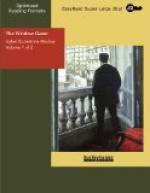“Jokes upon serious subjects are in very bad taste, young man,” said Aunt Caroline. But her rebuke was half-hearted. She looked uneasy. “John,” she added with sudden suspicion, “you don’t suppose they could have known we were coming?”
“How could they possibly?”
“If she is an Indian, they might. I’ve heard of such things. I—oh, John! Look!”
“Snake?” asked John callously. Nevertheless he followed Aunt Caroline’s horrified gaze and saw, with a thrill of more normal interest, a pair of dainty moccasins whose beaded toes protruded from the flap of one of the tents.
“Indian!” gasped Aunt Caroline. “Oh John!”
“Not a bit of it!” Our much tried physician spoke with salutary shortness. “They may be Indian-made but that’s all. I’ll eat my hat if it’s an Indian who has worn them. Did you ever see an Indian with a foot like that?”
Indignation enabled Aunt Caroline to disclaim acquaintance with any Indian feet whatever.
“It’s a white girl’s moccasin,” he assured her. “Lots of girls wear them in camp. Or,” hastily, “it may be a curiosity. Benis may be making a collection.”
Aunt Caroline snorted. Her gaze was fixed with almost piteous intensity upon the tent.
“D’you think I might go in?” she faltered.
“You might” said John carefully.
Aunt Caroline sighed.
“How dreadful to have traditions!” she murmured. “There’s no real reason why I shouldn’t go in. And,” with grim honesty, “if you weren’t here watching I believe I’d do it. Anyway we may have to, if they don’t come soon. I can’t sit on this grass. I’m sure it’s damp.”
“I’ll get you a chair from Benis’s tent,” offered John unkindly. “There are no traditions to forbid that, are there?”
“No. And, John—you might look around a little? Just to make sure.”
The doctor nodded. He had every intention of looking around. He felt, in fact, entitled to any knowledge which his closest observation might bring him. But the tent was almost empty. That at least proved that the tent belonged to Spence. He was a man with an actual talent for bareness and spareness in his sleeping quarters. Even his room at school had possessed that man-made neatness which one associates with sailor’s cabins and the cells of monks. The camp-bed was trimly made, a dressing-gown lay across a canvas chair, a shaving mug hung from the centre pole—there was not so much as a hairpin anywhere.
John crossed thoughtfully to the folding stand which stood with its portable reading lamp beside the bed. There was one unusual thing there, a photograph. Benis, as his friend knew, was an expert amateur photographer—but he never perched his photographs upon stands. This one must be an exception, and exceptions are illuminating.




